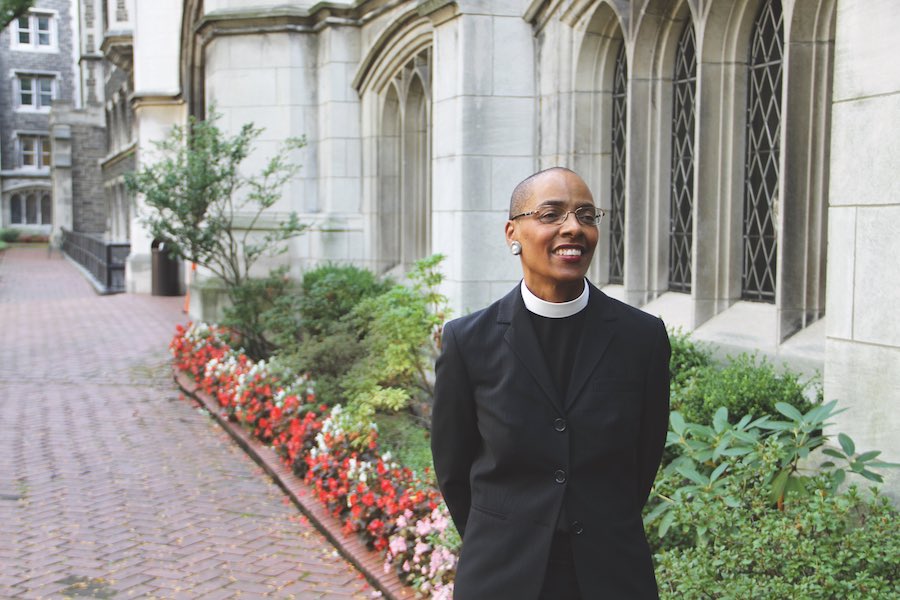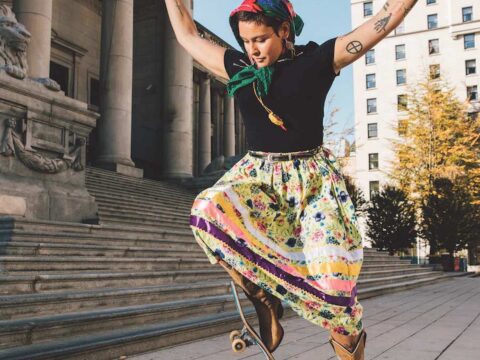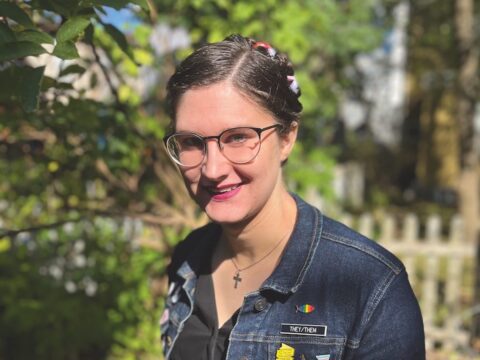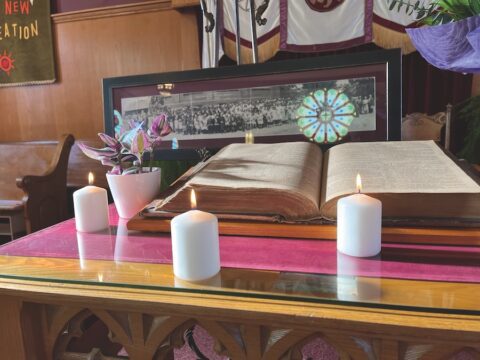As the former dean and now interim president of the Episcopal Divinity School in New York City, Rev. Kelly Brown Douglas is the first Black person to lead a seminary affiliated with the Episcopal Church. Throughout her career as a priest and author, she has explored the axis of social and spiritual justice with her clergy colleagues, theology students and eager readers.
Her latest book, Resurrection Hope: A Future Where Black Lives Matter, won the 2023 Grawemeyer Award in Religion. Prompted by her son’s frequent demands for God’s justice while Black Americans suffer under police brutality and white silence, Resurrection Hope dives into white Christians’ duty to fight for racial justice from a historical, biblical and spiritual perspective. Sherlyn Assam spoke to Douglas, whose office is in New York City.
You may unsubscribe from any of our newsletters at any time.
Sherlyn Assam: In Resurrection Hope, you describe how doubt is intrinsic to your faith as you navigate where God’s sense of justice fits in. What is it like entertaining doubt?
Kelly Brown Douglas: I do think doubt is intrinsic to faith. Every time we see something like what happened to Tyre Nichols – who was killed by Memphis police officers during a traffic stop in January – and are retraumatized by it, it’s not hard to find people of faith asking, “How long until this ends?” Those are the questions of faith. You have faith in this God, you have faith in the justice of God, yet you don’t see signs of that justice.
As I wrote in the book, in a deep moment of despair, I was going down to Black Lives Matter Plaza in Washington, D.C., in 2020. Those protests don’t happen unless people are hopeful that there can be a different future. As long as there are people who are fighting, who continue to say, “This is not the way it is supposed to be,” then that becomes the springboard for my faith. It leads me out of the doubt.
SA: What changes would you like to see concerning racial justice within Christianity?
KBD: I’m still waiting for white people to really begin. They’re the ones who are going to have to raise their voices and take the lead. Their humanity is what’s at stake — they need to realize that. White America that claims it’s not “MAGA America,” and white faith leaders who claim they aren’t the evangelical faith leaders who supported MAGA [Make America Great Again, the movement championed by former U.S. president Donald Trump] — they need to be the ones to say that we need wholesale change. The culture of policing in the United States has historically been anti-Black, emerging in so many ways from slave patrols. That legacy continues on, and white America needs to say, “This is about us.”
SA: Do you feel pressure as the head of a theological school because of your gender and race?
KBD: I don’t know if it feels like pressure. It feels more like accountability and responsibility because there are so many people who came before me who could have done this job but didn’t have the opportunity, yet those unsung Black leaders in the Episcopal Church paved the way. If it weren’t for Pauli Murray, the first Black female Episcopal priest in the church, I wouldn’t be here. I’m not here without Barbara Harris or Henry Delany, one of the first Black bishops in the early part of the 20th century. I’m accountable to them. I’m also accountable to my grandmother, who used to run an elevator and had a sixth-grade education. She came to Ohio during the Great Migration [the migration of six million Black Americans from southern states to northern ones between 1916 and 1970]. She set money aside that her grandchil- dren were to receive when we graduated from high school.
On the other hand, there’s the expectation of the Black woman. To be Black in America means that your parents and your grandparents are giving you the message that you can’t just be 100 percent — you’ve got to be 150 percent to be accepted as average with every- one else. That pressure is there. I think if you mess up in this role, then you close opportunities for other people who look like you. But again, I continue to see it as a privilege that I’ve got this role. And if that’s the burden, folks have carried bigger burdens.
SA: In your book, you discuss how the whiteness on which the United States was built is violent and can be sinful if not confronted. Can you expand on that?
KBD: I’ve said it before and will continue to say: you can’t be white and Christian. I don’t mean that in terms of looking like a white American, but instead, the construct of “white.” If you are a white American, you have to continue to interrogate your whiteness and live self-critically and self-reflectively. It’s so easy when you are white to fall into privilege. I think white churches and white religious leaders have to be intentional about engaging with their communities and talking about these realities of whiteness and white privilege. It’s not a class; it’s not like seeing a movie. This is daily, ongoing work. Some churches are really trying to engage this seriously and recognize this is a part of what it means to be a Christian. They have to interrupt anti-Blackness and call it out. If they don’t, then that means Black kids get killed.
More on Broadview:
- How well is Broadview meeting its 2025 diversity goals?
- The United Church’s numbers have dropped more than any other denomination
- What I need from white people right now
SA: What are some practical ways Christians can do better by God’s call for justice?
KBD: When we talk about reparations, we have to repair the breach between our unjust present and the just future that we claim to believe in. Christians have to take the lead in changing the systems and structures — like policing — that have created this breach. The garden is wide. Christians need to interrogate their own traditions and look at the infrastructure of their churches — both theologically and in terms of the actual fabric of these churches. What is the message we give? Is the only Black religious icon in our church Judas? If you believe that Black lives matter to God, then you need to have a religious iconography of Black bodies that reveals that. We, Black people, know the conversations we have to have with our children. There’s no way that you grow up Black in America and not know early on what it means to be a Black person and how to survive. What are the conversations white people are having with their kids? And if they aren’t going to have them in their own households, white faith leaders need to step out there and make sure that these conversations are taking place.
SA: What is your advice for people who have been deeply hurt by the church or who have left religion completely because their faith group didn’t recognize racial injustice?
KBD: I always say you can choose your church. We aren’t called into places that will continually harm us. We aren’t called into death — we’re called into life. People have to make their own decisions about whether or not this is a place they should be. I’m an Episcopalian. I’m in a church that is more than 90 percent white and had to decide, “Is that where I want to be?” It’s not just that the Episcopalian Church was complicit in slavery — our church was the church of wealthy slaveholders. We aren’t linked to it, we are it. But there are moments of hope, moments of commitment that you see. It’s not about asking people to be perfect. What I need to know is that you’re at least on the arc that bends toward justice. And if I know you’re on that arc, and you’re trying the best you can, it’s okay to mess up. But if the people around you can’t get on that arc, then you evaluate if that’s the place you need to be. I can’t have a dialogue with anybody who doesn’t respect my humanity and the humanity of people who look like me.
***
CORRECTION: A previous version of this story stated that Kelly Brown Douglas was the first Black person to lead an educational institution affiliated with the Episcopal Church, when instead she is the first to lead a seminary. This version has been corrected.
This interview has been edited and condensed for length and clarity. It first appeared in Broadview’s July/August 2023 with the title “Repairing the Breach.”
Sherlyn Assam is Broadview’s assistant digital editor and a Canadian freelance writer currently based in the U.K.













You have faith in this God, you have faith in the justice of God, yet you don’t see signs of that justice.
Psalm 103:8 Fortunately for all of us this verse is very true. I’m glad for myself and others that we don’t see God’s judgement this side of death.
Our jobs as Christians is to proclaim the Gospel, not to point fingers at each other.